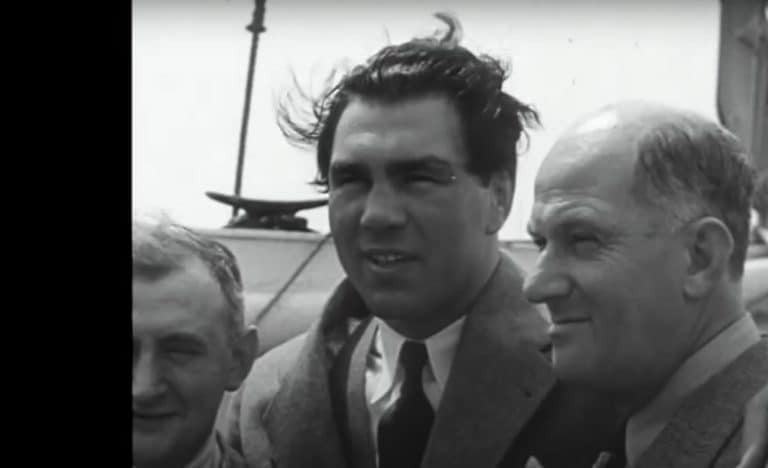By Stefan Radosavlević: Boxing is the hardest sport, both physically and mentally. Thousand of punches boxers take during their careers put their health and life in danger. As these are not enough, fighters sometimes have to face challenges that go beyond boxing.
Society is, very often, a much bigger opponent than the man in the ring. Maximilian Adolph Otto Siegfried Schmeling was one of those boxers that had to fight on two fronts.
Born in 1905, his life was marked by two world wars, nazism, and political and economical crises. Accused of being a coward, a nazi supporter, wounded in battle, financially broke, and fighting to survive, Schmeling overcame every barrier placed in front of him.
He started boxing in 1924, and by the end of 1927, he became the European heavyweight champion and one of the best young heavyweight boxers in the world. In his first big test, Max defeated Jack Sharky to win NYSAC, NBA, and Ring heavyweight titles.
After a low blow, Sharkey was disqualified, and Schmeling become a champion, the first one to win a heavyweight championship on a foul.
The American public didn´t accept this outcome, and Max was called a ”low-blow champion” and accused of being a coward. This was the first of many blows that he took outside of the ring.
A couple of years later, in 1933, when Schmeling faced his namesake Max Baer, he was proclaimed a nazi. Max Baer was Jewish, and from January 1933, Hitler was in power in Germany, openly showing to the world his antisemitism. The press and public were very hard on Schmeling, and his defeat was celebrated as a victory over Hitler.

Unfortunately for German fighters, this was only the beginning. Max´s two bouts with Joe Louis in 1936 and 1938 made him one of the most popular sports stars in the world.
At the same time, the pressure from the media and fans became huge. Newspapers were full of texts that showed Schmeling as a ”Nazi puppet” and Hitler’s friend. This was especially visible in his second fight against Louis. The bout had racial and political undertones; it was the USA against Germany.
After their first fight, Joe´s defeat was received as a national tragedy, with grown-up people crying on the streets. The second win would be a big blow for the United States and would´ve been used for Hitlers´s nazi propaganda.
Max received a great amount of hate mail, his corner man refused to work with him due to bad publicity, and his long-time Jewish trainer Jacobs was forbidden by New York State Athletic Commission to be in Schmeling´s corner. ”Battle of the century” happened on June 22. 1938.
More than 70,000 thousand fans in Yankee Stadium booed the German boxer and threw garbage at him after his twelfth-round knockout of the ”Brown Bomber.” Looking at this event more than 80 years later, it is hard to even imagine the amount of pressure Max was dealing with.
He was never a member of the Nazi party and openly denied their propaganda about racial superiority. ”I am not Superman in any way,” said Max before one of his fights. He refused Nazi Party demands to leave his long-time trainer Joe Jacobs, who was Jewish. Max put himself in even greater danger when he refused to take the ”Dagger of Honor“ award offered to him by Hitler himself.
Many years after the war ended, the public discovered that Schmeling was hiding two Jewish children, most certainly saving their lives. So, he was hated in America for being from Nazi Germany, and, at the same time, he could’ve easily lost his head for opposing Nacizm. All that time, Max was fighting at the highest level against world-class opposition, showing courage and nerves of steel.
Today, boxers have many excuses for why they lost a fight or why are they not fighting at all. Boxing fans are used to hearing explanations, crying, and complaining. Schmeling, Dempsey, Ali, and Louis are examples of what real champions are made of.
Max´s hardships did not end with that famous 1938 defeat by the “Brown Bomber.” He was recruited into the German army and wounded in the ”Battle of Crete” in 1941. After the war, he faced financial struggles, fighting to survive.
The ”Black Uhlan of the Rhine” became a successful farmer, producing chickens, tobacco, and mink. In the late 50s, Max was offered to be the face of Coca-Cola in Germany, which made him a rich man. He died in 2005. at the age of 99. Max and Joe stayed friends until Joe´s death in 1981.
